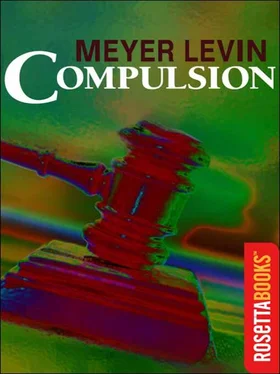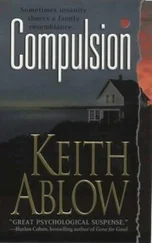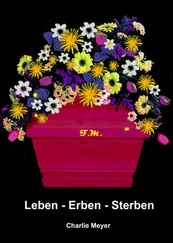“And you’re not sure you’re in love?”
“Oh,” she says thoughtfully, “I sometimes feel as if it’s already settled that I’m going to marry Sid. And then sometimes I feel as if some wonderful unknown thing still has to happen.”
“Does he intend to marry you.”
She laughs softly. “Even after he gets out of school – a reporter doesn’t earn enough to get married on. And Sid wants to write. And… I don’t know.”
“I see.” They are silent for a moment. “You don’t mind my being so inquisitive?”
“Don’t you have to find out if the coast is clear?” Again her soft laugh.
“Is it?” He reflects how cleverly this female has put him into the rôle of a possible serious suitor. Judd finds himself saying, “Perhaps Sid will win the reward on the murder case – he’s working so hard on it. And then you can get married.” Why has he mentioned the case? He is getting as bad as Artie.
But it seems a normal subject to her. “Oh, is there a big reward?”
“The papers said several thousand dollars, I think.”
“I don’t think anybody needs a reward to try to catch them,” she remarks. And after a musing silence: “I’m not really ready to get married. There are still things I want to do.”
“Like what?”
“Oh, go abroad.”
She recalls that he is to go in a few weeks, and she says she envies him, and Judd offers the expected persiflage about her coming along, and she says she would if she only had the money, and he finds himself saying, “Well, I’ve got an idea how to get the money for you! I’ll confess to the murder! I’ll get the reward – and that will pay for your trip!”
“There’s only one thing wrong with that” – she takes up the game – “you wouldn’t be able to come along!” And then: “Would you really do that for me?”
“Why not?” he says. “And it would be an experience to see if I could make them believe me.”
“I’m afraid I couldn’t accept such a sacrifice,” she says, but then her voice drops. “It’s cruel for us to be joking about such a thing.”
“Why?” he demands. “Why is it cruel to joke about death? After all, what is one creature more or less in the world?”
Her mouth opens. But then, as though catching on to his line, she says, “I think you say things just to shock people, to be different.”
A tiny spasm of irritation runs through him at her words. Unaccountably, Judd thinks of his mother, of the first time he brought down a bird, a robin, with a B-B gun they had given him, as a little kid. How Mother Dear softly explained to him that he really didn’t want to kill the bird for no purpose. People made guns that could kill, it was true, Mother Dear had said, but they used their guns always for a reason. To protect themselves from wild beasts, or to hunt for food. Or to study animals, like the mounted birds in the museum. As she talked, Judd had felt angry, cheated. And the same shadowy feeling of resentment has come over him now at Ruth’s sententious words.
With a secret pleasure, he heads for the stand where he stopped with Artie. “They’ve got wonderful hot dogs here,” he says.
Ruth leans back. “Oh, I’m so hungry I could eat an elephant.”
“With mustard and piccalilli?”
“Everything!”
She sits waiting as he goes to the stand. She looks so right, the pretty girl in the car. Judd tells himself she isn’t precisely beautiful; it is rather a supremely blooming quality that gives her such appeal. It is the sex urge that is causing him to endow his reactions with aesthetic value. Why can’t this be just a date; why can’t he simply take a nice girl out on the dunes?
He turns down the side road toward Miller’s Beach, stopping the car at the edge of the sand. Ruth gets out; she stands for a moment, breathing full, her blouse rising with her breath. Judd takes the binoculars from the side pocket.
“Is this where you come to watch the birds?”
He tells her it was here that he discovered the Kirtland Warbler.
“Discovered?”
The species hadn’t been seen for decades, he informs her, and was assumed to be extinct. “I don’t go by other people’s assumptions,” he says. It is this kind of remark that makes people dislike him, Ruth realizes. But can’t they see that he has to do it, from some need, some weakness?
Judd tells her how he searched all last spring. And then, one day, he recognized the warbler’s call.
“But you had never heard it before?”
“When I heard it, I knew it.”
“That must be such a wonderful feeling,” Ruth says, “to be the discoverer, to be the first.”
“I’d like to be the first with you,” he remarks, with the expected double meaning. Boys feel they have to say things like that, Ruth knows, and momentarily it even gives her a sunny sensation that Judd has made a silly remark, like an ordinary boy. She feels a surge of sureness – something good is happening – and she gives him her hand so he may pull her up a steep dune. Everyone likes being “different”, but with Judd it is such a terrible passion. Like the way he has to brag about the different courses he takes at school, how he is the only student in that course in Umbrian dialect. And here, his pleasure seems to have been not so much in what he discovered but in having been alone to prove others were mistaken.
He drops her hand and hurries ahead. There is a dip between dunes, an area of stunted bushes, forming clusters in the sand. She comes alongside him and stands still, as he is standing.
“Oh, it’s so wonderful here,” Ruth says. “The sand is untouched.” It looks as if no one in the whole world had ever been here before.
He moves a few steps, and she moves, but then Judd makes a halting gesture with his hand, and Ruth freezes, her arm arrested gracefully. Judd listens. There are a few calls. Not the warbler. “Hear anything?” he asks.
“I was afraid to breathe,” she says softly.
“You can breathe,” he says.
“Doesn’t it frighten them to hear people talk?”
“You can talk. Just naturally, so the voices fit in.”
“I think I never listened to nature before,” Ruth says. “I mean, just to the air. It’s as though the sky itself had a sound, not quite a sound, but-”
“I know,” Judd says. And he is startled, at a feeling as of anguish rising up in himself.
He leads her farther, over several dunes, until they are well away from where any beachgoers might wander. Then he slips down on the sand, nesting down behind some shrubs. She settles herself beside him, her legs neatly folded. “Is this where you found your bird!” she asks.
Judd draws out his wallet to show her the picture of the warbler perched on his hand, feeding. This is the same picture that his father has enlarged to keep on his desk at the office. Judd tells himself that he has not forgotten his purpose in coming, and the self-wager he made over the call of the bird.
Then they listen for calls. She sits alert, listening. “A mating call,” he remarks. He focuses the field glasses, and directs her to a low distant branch, the birds flickering around it, alighting, circling, alighting. A curl of her hair moves against his cheek.
“This is what you really love, isn’t it!” Ruth says.
Judd doesn’t reply. He feels a choking rush of conflicting emotions; he feels invaded by her, and he turns against this a scorn for her, for her female sentimentality. And yet the same sense of anguish has returned, as though her voice has touched upon some unbearably sensitive mechanism within him.
“I can always do this,” he says.
He puts the glasses to her eyes. After a moment Ruth remarks, “It makes you wonder if we ourselves might be watched, like this, by superior beings.”
Читать дальше












